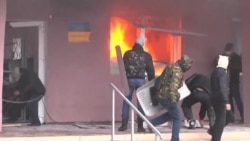DONETSK —
Pro-Russian protesters in eastern Ukraine stormed another police station Monday as they continued to defy a government deadline to vacate occupied buildings in exchange for amnesty. Ukraine’s president has called for U.N. peacekeepers to help in an anti-terror operation against the separatists.
Monday was meant to signal the start of the Kyiv government’s military assault. Instead, the pro-Russian protesters gained more ground, smashing their way into the police headquarters in the city of Horlivka near Donetsk.
One Western journalist was attacked - the latest in a series of incidents involving foreign media.
Later, the pro-Russian gunmen declared that the police had switched sides.
An unnamed gunman announced that “All the heads of regional administrations [in the east] have switched to the side of the people and refused to recognize the government in Kyiv."
In Slovyansk, heavily armed gunmen seized a nearby airfield, which they claim had been used by government forces Sunday.
The head of the self-proclaimed Slovyansk Self-Defense Force, Vyacheslav Ponomarev, appealed to Moscow for help.
"Respected president of the Russian Federation,” he said, “we urge you to personally pay attention to the current situation and help us as your powers and possibilities permit.”
Western governments say Russia already is behind the protests. Military observers say the protesters’ modern weaponry is identical to that used by the Russian military.
Moscow denies involvement.
In Kyiv, frustrated Ukrainians took to the streets to demand the government take action against separatists in the east.
Acting President Oleksandr Turchynov questioned police loyalty.
“Today they are demonstrating an inability to defend citizens, and actively withstanding the terrorism and separatist movement,” he said.
However, the president held out the possibility of holding a referendum on Ukraine’s future.
That apparent concession emboldened protesters in the eastern city of Donetsk. On stage, speakers demanded a referendum while some in the crowd answered with chants of ‘Russia.’ But within the protest movement, there are disagreements.
Local resident Dima welcomed the possibility of a referendum.
“I want the referendum," he said. "Everyone should be asked how they want to live. Personally, I want to live in Russia.”
Another Donetsk resident, Anatoli Bitavych, disagreed.
“I would vote to stay in Ukraine," he said. "I want to live in Ukraine, but to be separated from the center and the west.”
Talk of a referendum may help to de-escalate the situation.
But as protesters occupy more state buildings, the authority of the Kyiv government in eastern Ukraine appears to be weakening by the day.
Monday was meant to signal the start of the Kyiv government’s military assault. Instead, the pro-Russian protesters gained more ground, smashing their way into the police headquarters in the city of Horlivka near Donetsk.
One Western journalist was attacked - the latest in a series of incidents involving foreign media.
Later, the pro-Russian gunmen declared that the police had switched sides.
An unnamed gunman announced that “All the heads of regional administrations [in the east] have switched to the side of the people and refused to recognize the government in Kyiv."
In Slovyansk, heavily armed gunmen seized a nearby airfield, which they claim had been used by government forces Sunday.
The head of the self-proclaimed Slovyansk Self-Defense Force, Vyacheslav Ponomarev, appealed to Moscow for help.
"Respected president of the Russian Federation,” he said, “we urge you to personally pay attention to the current situation and help us as your powers and possibilities permit.”
Western governments say Russia already is behind the protests. Military observers say the protesters’ modern weaponry is identical to that used by the Russian military.
Moscow denies involvement.
In Kyiv, frustrated Ukrainians took to the streets to demand the government take action against separatists in the east.
Acting President Oleksandr Turchynov questioned police loyalty.
“Today they are demonstrating an inability to defend citizens, and actively withstanding the terrorism and separatist movement,” he said.
However, the president held out the possibility of holding a referendum on Ukraine’s future.
That apparent concession emboldened protesters in the eastern city of Donetsk. On stage, speakers demanded a referendum while some in the crowd answered with chants of ‘Russia.’ But within the protest movement, there are disagreements.
Local resident Dima welcomed the possibility of a referendum.
“I want the referendum," he said. "Everyone should be asked how they want to live. Personally, I want to live in Russia.”
Another Donetsk resident, Anatoli Bitavych, disagreed.
“I would vote to stay in Ukraine," he said. "I want to live in Ukraine, but to be separated from the center and the west.”
Talk of a referendum may help to de-escalate the situation.
But as protesters occupy more state buildings, the authority of the Kyiv government in eastern Ukraine appears to be weakening by the day.









